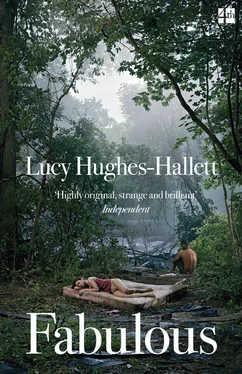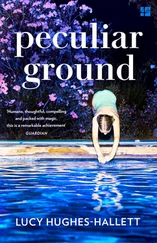The darkness had thinned. He could see dimly. He could see Eurydice. She was wearing a headscarf tied under the chin, the way she used to when he first knew her. Again, there was that warmth. She looked exasperated as she caught his eye and then he could see her bracing herself again. She moved her hands as though she was smoothing out a tablecloth. She said, ‘Never mind, darling.’ He surged on, helpless, while she drifted and spun a while, and then began to sink, so slowly that she seemed to be barely moving, back into the murk.
‘You couldn’t have saved her,’ said Milla. ‘Nobody could.’ Oz knew that. He was a rational human being, except when he was tired or flustered. He knew that a hospital was a place from which one couldn’t count upon returning. He just wished that he could have died too.
His voice was not what it had been of course, but it was still a marvellously affecting instrument. A group of young women who performed folk songs a capella invited him to join them on tour. On stage they deferred to him. In the B-and-Bs they fussed over him, and made him hot drinks and lent him their pashminas to wrap around his throat. Reviewers were snide. ‘What’s happened to him?’ asked his agent. ‘Has he lost his marbles?’ ‘Well yes, he has,’ said Milla. ‘He’s also lost his wife.’
He was quite a bit younger than me, than most of us actually, but he called us his ‘boys’. Looking back on it, I’m surprised no one protested, not even Eliza. ‘Let’s do it, boys,’ he’d go, at the end of the Friday meeting. ‘Let’s nail those sales.’ When we went for a drink (which we did weekly, it was the next piece of the Friday warm-up), Acton talked like a human being, an English one from suburban south London, but in the meeting room he spoke as though he’d picked up his entire vocabulary from Business and Management manuals, and like his parents (nice people, mother a greengrocer, father a nurse, proud of him) were part of Chicago’s criminal aristocracy.
Americans think British voices are darling. The British think American voices sing of potency and success. Acton was phoney through and through, but we didn’t care. We relished the smoothness of his act. Estate agents aren’t crooks, contrary to popular belief – I mean not many are – but we are all performers. We were accustomed to seeing each other, on heading out to meet a prospective buyer, pop on a new persona while picking up the keys. We knew, when Acton was bullshitting, that he was doing what he had to do, and the great thing was, if he succeeded, we each got a cut.
Diana had been surprised when he proposed that the entire sales department should pool their commissions. That wasn’t normal, not in our outfit. She suspected that he was exploiting us, but he was subtler than that. He wanted us to love him more than we envied him. You couldn’t imagine him getting his knees muddy, but he had a football coach’s appreciation of group dynamics. When you think about it, team spirit isn’t altruism. It just makes sense. One of the reasons he closed the most deals was that he kept the best properties for himself (‘What my clients pay over-the-odds for is exclusivity,’ he said), but another was that he was a brilliant salesman, seducer, beguiler, fiddler with the minds of the credulous. We all found him irritating: but we were all thankful for the luck of being on his team. It was down to him that I felt able to propose to Sophie that year, down to him that we got together the deposit for our flat in Harlesden. And, yes, it was Acton who spotted the flat in the first place and told me it was under-priced and that we should swoop. Sometimes a good leader lets a bit of profit pass, because to have your underlings indebted to you – that’s gold.
Diana had known him since he was in nappies. He was her best friend’s kid brother and the two girls, babysitting, would pootle around the bathroom while he watched them with a small boy’s sly judgemental eyes. When they put on face-masks he cried. When they wiped them off again he chuckled, and danced a little foot-to-foot shuffle to celebrate their resumption of their normal selves. They made healthy carrot and hummus snacks for themselves – because they were teenaged girls and wanted to be clear-skinned and lovely – and he ate them. They cooked cocktail sausages and oven chips for him and – because they were teenaged girls and perpetually ravenous – they ate them faster than he could. They all dressed up together in his mother’s clothes, the big girls prancing and preening in the mirror, with Prince playing, and the fat toddler tangling himself up in satin blouses that felt like cool water against his eczema. And then they shared hot water, getting in the bath together – little Acton propped and corralled by four skinny girl-legs, his eyes closed to savour the bliss of it, his eyes snapping open again to examine the sleek pale-and-rosy oddity of other people’s flesh.
Diana told Sophie about those times once, when they met by chance at the gym. But she wouldn’t have told me. She always plays by the rules. A senior manager does not invite a team member to imagine her in an informal domestic situation. Unprofessional.
Anyway that was all ages ago. When he applied for the job Diana left the decision to HR, and when he got it, unaided by her, she said, in front of all of us, ‘I’ve known Acton for ever, but it doesn’t necessarily follow that he’ll be for ever in this job. As you’ll all be able to tell him, what counts here isn’t who knows who, it’s who sells what.’
He sold. And he rose.
Hunting parties, he called them.
You’d have thought by that time there wouldn’t have been any Victorian warehouses left undeveloped, but that just shows how wrong you can get. You had to go further out if you wanted affordable, naturally. But if money was no object there were still buildings whose owners had been playing a waiting game. There was one that came up in Wapping. Cinnamon Wharf. Acton was on it from the start. In fact he got it. And that’s where the parties happened.
How did he get it? Like this.
We all ran. Everybody ran. From 12.30 to 2 p.m. the Embankment was a narrow arroyo with a stampede on. It looked like there’d been a fire in a city-sized gym, and men and women, grim-faced and sweating, were fleeing for their lives, with nothing on but lycra and nothing precious saved but their earbuds.
I’m a bit of an oenophile. In my daydreams professional men, wearing silk socks and silk ties and three pieces each of good suiting, treat each other to lunch – luncheon – in wood-panelled rooms where the meat comes round on trolleys, and solicitous waiters press them to take a second Yorkshire pud or another ladleful of gravy with their bloody beef. That’s the setting for the proper savouring of a good burgundy. That’s the way our great-grandfathers did it. God knows how anyone got anything done in the afternoons. Now I drink my wine after work, by the glassful, standing up in a bar, with a sliver of C omté to complement it. The gratification of fleshly appetites during business hours is out. Lunchtime, like the rest of us, I’m out mortifying the flesh.
Acton ran too, but he didn’t have a pedometer, or a thingummy on his phone that informed him how many calories he was consuming. Instead he had a map that he’d somehow got hold of (he had a friend in the planning department, every canny agent does) that showed him where buildings stood empty, where an application had been refused, where a freeholder was struggling to pay council tax. He’d sprint off in the right direction, nostrils aquiver, but once he was turning into the street he’d lollop along, laid-back, easy does it, a harmless young fellow with an interest in architecture, just keeping an eye out for a wrought-iron balustrade or fine tracery on a fanlight. Curious, yes, but not intrusive. Appreciative, not predatory. If there was somebody about he’d pause and hold his foot up to the back of his thigh, doing a bit of a stretch as anyone might, and ask some idle questions. Such unusual brickwork on that doorway. Bet that building’s seen some things in its time. All converted into swanky studios now, probably? No? Owner must be pretty relaxed to let it stand empty. Oh. Sitting tenants? Poor guy.
Читать дальше











